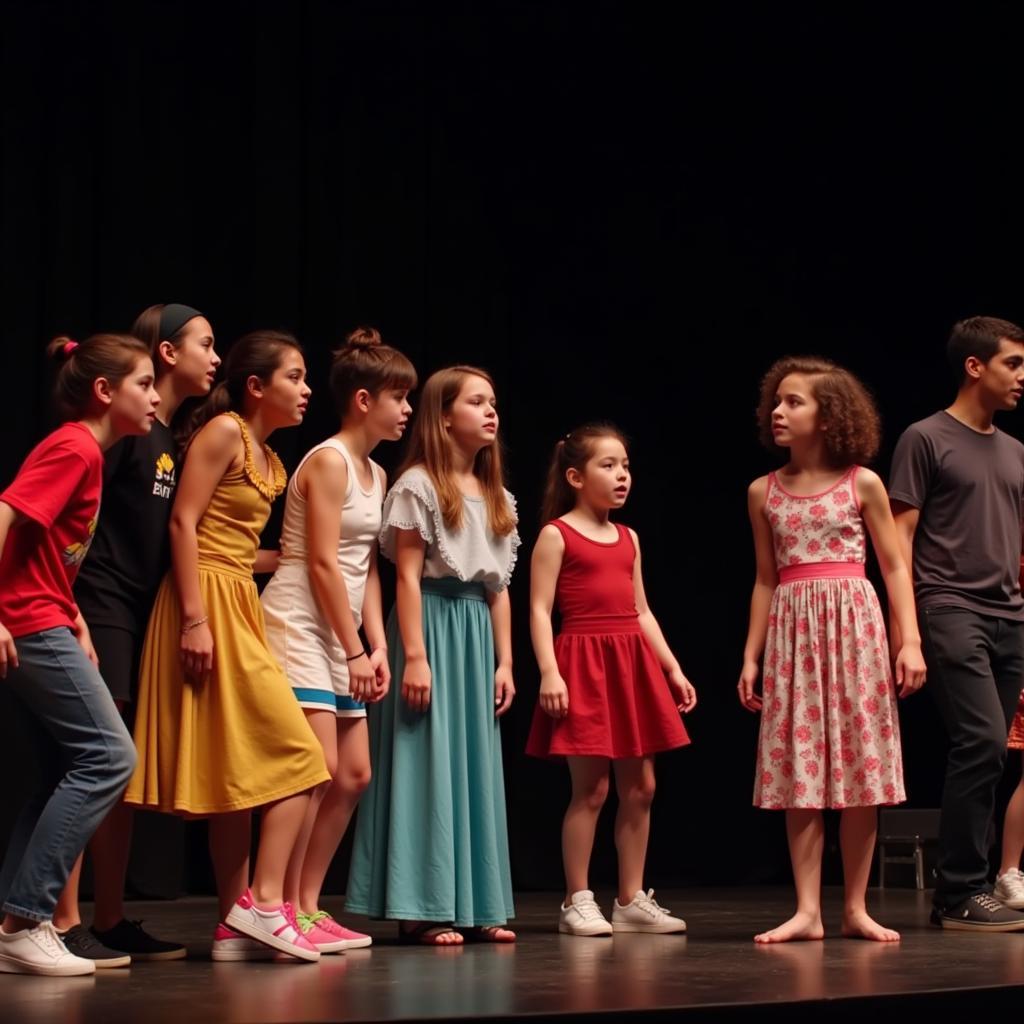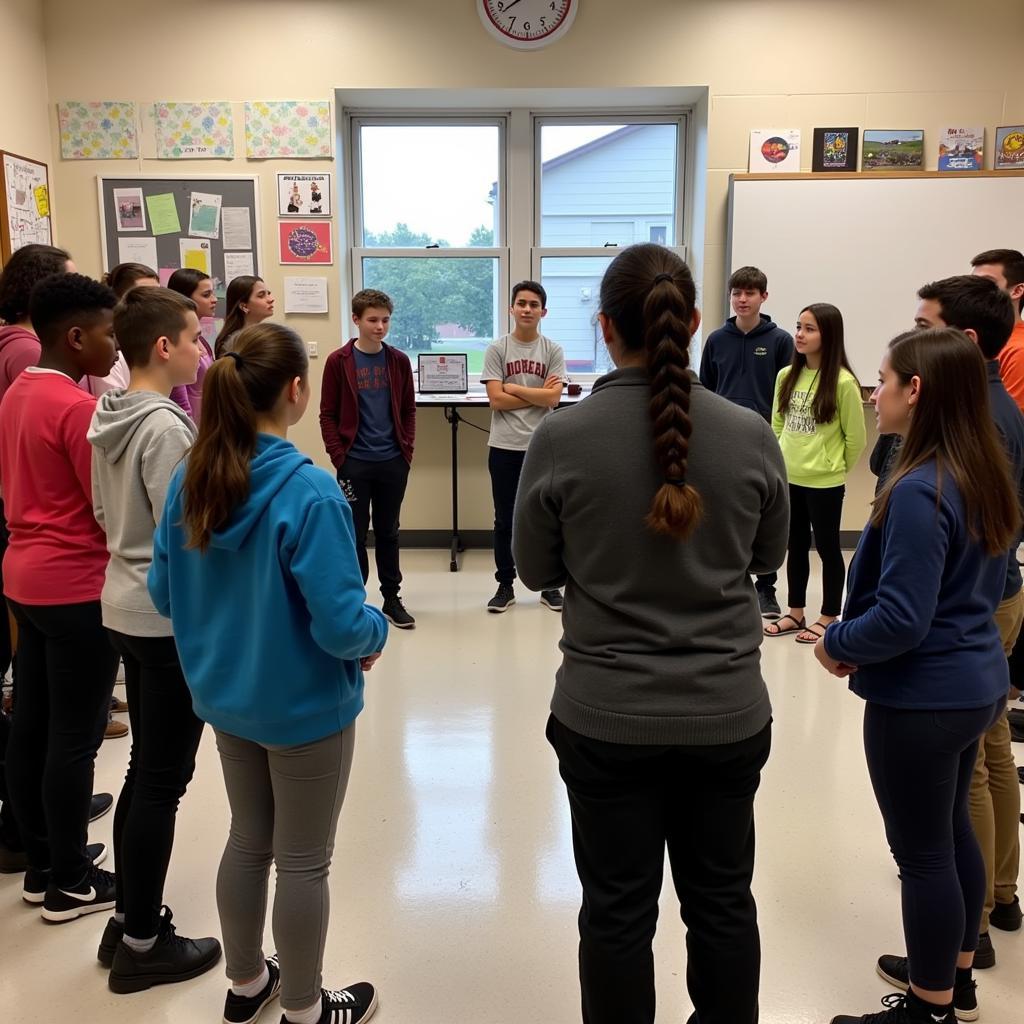Drama and theater have been recurring themes in IELTS Writing Task 2 essays, reflecting their significance in educational debates. Based on past exam trends and the current emphasis on arts education, this topic is likely to appear in future tests. Let’s explore a common question format and analyze sample essays at different band levels.
Some people think that school children should study drama and theater as a part of their academic curriculum. Others believe that these subjects are a waste of valuable school time. Discuss both views and give your own opinion.
Analyzing the Question
This question follows a classic IELTS format, asking candidates to discuss two opposing views and present their own opinion. The key elements to address are:
- Arguments for including drama and theater in schools
- Arguments against including drama and theater in schools
- Your personal stance on the issue
It’s crucial to present a balanced discussion of both viewpoints before stating your opinion, ideally in the conclusion.
Sample Essay 1 (Band 8-9)
The inclusion of drama and theater in school curricula has sparked debate among educators and policymakers. While some argue for their educational value, others consider them an unnecessary diversion from core subjects. This essay will examine both perspectives before presenting my own view.
Proponents of drama and theater in schools argue that these subjects offer unique benefits to students’ overall development. Firstly, participation in theatrical activities can significantly enhance communication skills, boosting confidence in public speaking and interpersonal interactions. Moreover, drama encourages creativity and emotional intelligence, as students learn to embody different characters and understand various perspectives. These skills are increasingly valued in the modern workplace, where adaptability and empathy are crucial.
On the other hand, critics contend that dedicating school time to drama and theater detracts from more essential academic pursuits. They argue that subjects like mathematics, sciences, and languages should take precedence, as these form the foundation of a student’s future career prospects. Additionally, skeptics point out that not all students are interested in or talented in performing arts, making compulsory drama classes potentially frustrating for some learners.
In my opinion, while core academic subjects are undoubtedly important, the inclusion of drama and theater in school curricula offers invaluable benefits that complement traditional education. These subjects provide a holistic approach to learning, fostering creativity, empathy, and self-expression – qualities that are essential in today’s rapidly changing world. Furthermore, the skills developed through drama, such as teamwork and public speaking, are transferable to various aspects of life and work.
In conclusion, I believe that the advantages of incorporating drama and theater into school curricula outweigh the potential drawbacks. A balanced approach, where these subjects are offered alongside core academic studies, can provide students with a well-rounded education that prepares them for the diverse challenges of the future.
 Students performing in a school play demonstrating drama and theater skills
Students performing in a school play demonstrating drama and theater skills
Sample Essay 2 (Band 6-7)
The topic of whether school children should study drama and theater as part of their curriculum is debated by many people. Some think it’s important, while others believe it’s a waste of time. This essay will discuss both sides and give my opinion.
Those who support drama and theater in schools say it helps students in many ways. It can make students more confident when speaking in public and help them work better in teams. Also, acting in plays can make students more creative and help them understand other people’s feelings better. These skills can be useful in many jobs later in life.
However, some people think that drama and theater take time away from more important subjects. They believe that students should focus more on subjects like math, science, and languages because these are more likely to help them get good jobs in the future. They also say that not all students like acting or are good at it, so it might not be fair to make everyone do it.
In my opinion, I think drama and theater should be part of the school curriculum, but not as important as main subjects. They can help students learn useful skills that they might not get from other classes. But I also think it’s important to focus on core subjects that will help students in their future careers.
To conclude, while drama and theater can be beneficial for students, they should be balanced with other important subjects in school. This way, students can get a good education that includes both academic knowledge and practical skills.
 Students rehearsing in a drama class at school
Students rehearsing in a drama class at school
Sample Essay 3 (Band 5-6)
Many people have different ideas about drama and theater in schools. Some think it’s good for students to learn, but others think it’s not useful. I will talk about both sides and give my opinion.
People who like drama in schools say it helps students. It can make students speak better in front of others and work well with friends. Acting in plays is fun and can make students more creative. These things can help them in their jobs later.
But some people don’t like drama in schools. They think students should study more important things like math and science. These subjects can help students get good jobs. Also, not all students like acting, so they might not enjoy drama classes.
I think drama and theater are good for students, but maybe not as important as other subjects. It can teach students useful things, but they also need to learn other subjects to get good jobs.
In conclusion, I believe schools should have some drama classes, but not too many. Students need to learn many different things to be ready for their future.
Explanation of Band Scores
Band 8-9 Essay:
- Fully addresses all parts of the task with a well-developed response
- Presents a clear position throughout the essay
- Uses a wide range of vocabulary with very natural and sophisticated control
- Uses a wide range of complex structures with full flexibility and accuracy
- Has very good organization with clear progression throughout
Band 6-7 Essay:
- Addresses all parts of the task, though some parts may be more fully covered than others
- Presents a relevant position, though conclusions may become unclear or repetitive
- Uses an adequate range of vocabulary with some errors in word choice
- Uses a mix of simple and complex sentence forms
- Has coherent organization, though there may be occasional inconsistencies
Band 5-6 Essay:
- Addresses the task only partially; the format may be inappropriate in places
- Expresses a position but development is not always clear
- Uses limited range of vocabulary; errors may cause some difficulty for the reader
- Uses a limited range of structures with some attempts at complex sentences
- Presents information with some organization but there may be a lack of overall progression
Key Vocabulary to Remember
- Curriculum (noun) /kəˈrɪkjələm/ – the subjects comprising a course of study in a school or college
- Holistic (adjective) /həʊˈlɪstɪk/ – characterized by the belief that the parts of something are intimately interconnected
- Interpersonal (adjective) /ˌɪntəˈpɜːsənl/ – relating to relationships or communication between people
- Empathy (noun) /ˈempəθi/ – the ability to understand and share the feelings of another
- Adaptability (noun) /əˌdæptəˈbɪləti/ – the quality of being able to adjust to new conditions
- Transferable (adjective) /trænsˈfɜːrəbl/ – able to be moved or applied to another situation
- Diversion (noun) /daɪˈvɜːʃn/ – an activity that diverts the mind from tedious or serious concerns
- Precedence (noun) /ˈpresɪdəns/ – the condition of being considered more important than someone or something else
- Compulsory (adjective) /kəmˈpʌlsəri/ – required by law or a rule; obligatory
- Skeptics (noun) /ˈskeptɪks/ – people inclined to question or doubt accepted opinions
In conclusion, the topic of drama and theater in schools is likely to remain relevant in IELTS Writing Task 2. Future questions might explore the balance between arts education and STEM subjects, the role of creativity in the curriculum, or the impact of performing arts on student well-being. To prepare, practice writing essays on related topics such as:
- The importance of arts education in a technology-driven world
- Balancing academic and creative subjects in school curricula
- The role of extracurricular activities in student development
We encourage you to practice writing your own essay on this topic and share it in the comments section for feedback and discussion. This active engagement will help you improve your writing skills and prepare effectively for the IELTS exam.
The importance of arts education in schools provides additional insights into this topic, which can further enhance your understanding and essay writing skills for IELTS Task 2. For those interested in exploring more about The importance of arts education in schools., this resource offers valuable perspectives that can enrich your essays on similar topics.


